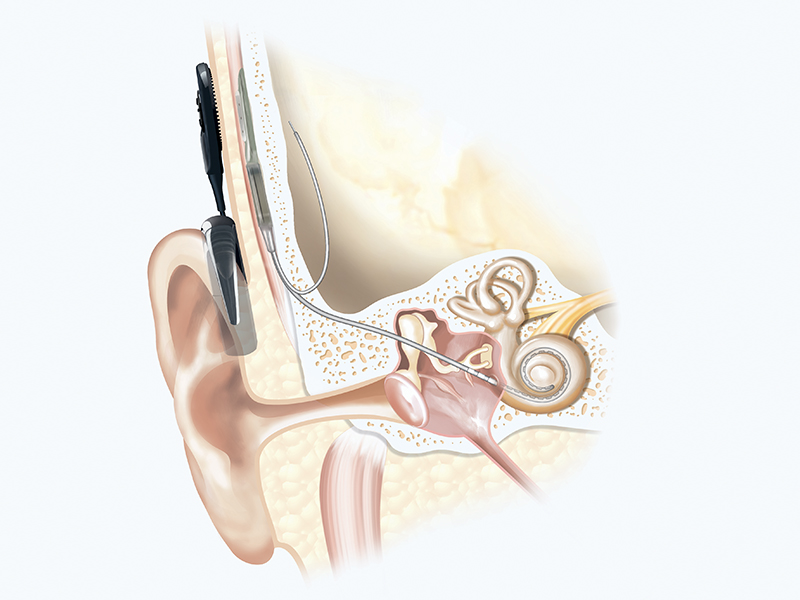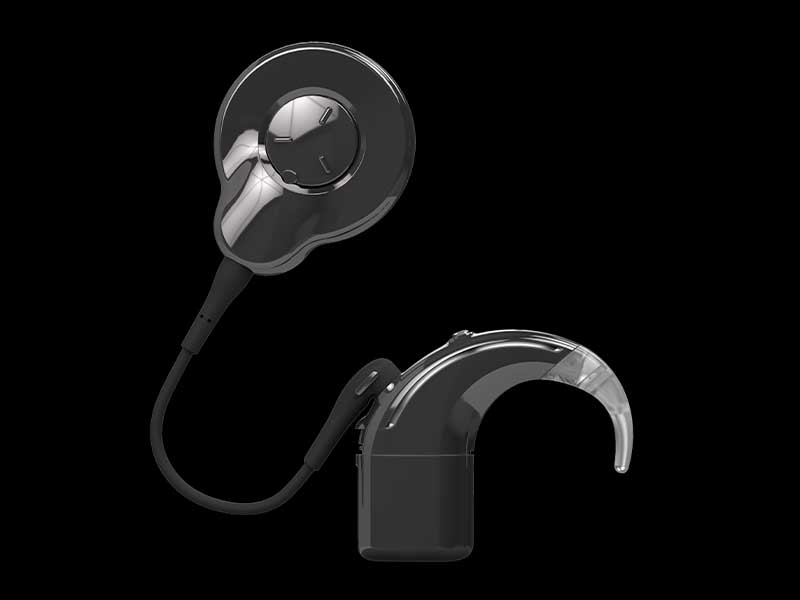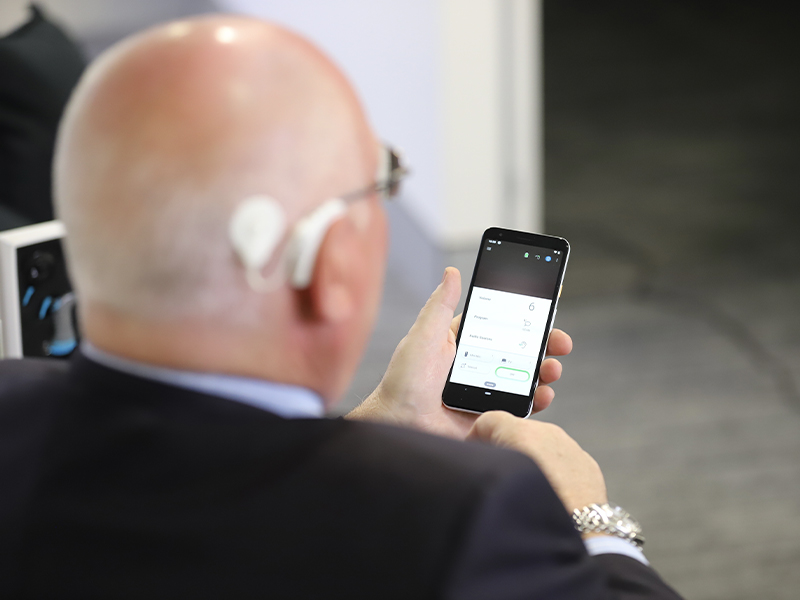Whether you’re in your early 40s or well into your 60s, hearing loss can affect you. And you may not even realise it. Here’s a look at the health implications of untreated hearing impairment, some common misconceptions keeping many people from getting the treatment they need, and how Cochlear implants can help when hearing aids can’t.

Hearing loss is a growing concern
Hearing loss is a partial or total inability to hear in one or both ears. It affects 1.5 billion people globally (20 percent of the world’s population!), according to the World Health Organisation. Yet, it’s estimated that 466 million are living with disabling hearing loss.
How is it possible that such a widespread condition is so undertreated? The reasons are varied and complex, but it’s likely that misconceptions and misinformation prevent the treatment of hearing loss from becoming the important conversation it needs to be.
One of the effective ways to treat hearing loss is through Cochlear implants, explains Dr Rebecca Heywood, a British ENT surgeon in Singapore with 25 years’ experience managing complex ear and hearing conditions in children and adults.
All too often, she sees patients who have suffered disabling hearing impairment for years, only to find out that the condition – and its health risks – could have been treated effectively, much earlier on. By changing mindsets and spreading awareness about hearing implants and Cochlear implant surgery, she hopes more people will have the clarity they need to take their hearing health seriously.
Here, Dr Heywood shares five facts that can help set that mission in motion.
#1 Just because you can hear doesn’t mean you’re not suffering from hearing loss
For many people, hearing loss develops quite slowly, making it difficult to observe any obvious changes in hearing abilities. “It happens very insidiously, so many people don’t realise they have hearing loss until it becomes severe enough to impact everyday life.”
Of course, as hearing impairment worsens, the signs become more obvious. But, even then, many people tend to let the condition go unchecked because they can technically still hear sound.
“There’s this big belief that hearing loss means that you can’t hear anything. So, many people continue to struggle and, in doing so, they miss out on so much,” says Dr Heywood. “I’ll ask my patients, ‘Do you have a problem with your hearing?’ and they’ll say, ‘No, I can hear people talking.’ But, if I ask them, ‘Can you understand what people are saying or do you have to strain to catch what’s being said?’ they’ll say, ‘Yes, I do that, but I didn’t know that was hearing loss.”
Some of the most common signs of hearing loss include:
- difficulty hearing conversations clearly (muffled hearing), particularly in noisy environments
- frequently asking people to repeat themselves
- speaking too loudly or too quietly; and
- increasing the volume of the TV beyond others’ comfort levels.
Getting tested is a good way to catch hearing impairment early before it progresses, says Dr Heywood. You probably won’t find hearing included in your yearly preventative screening package (another challenge for people taking their hearing health seriously). However, she recommends yearly hearing tests for over 50s, or younger if there’s a family history of hearing loss.
#2 Hearing loss has many determining factors
Sensorineural hearing loss, or age-related hearing loss, affects 50 percent of Singaporean adults over the age of 60. It is the primary cause of hearing loss here in Singapore. Worldwide, sensorineural hearing loss is most common in adults over the age of 60. This has to do with an increased prevalence of sensory loss with age, explains Dr Heywood.
Aside from age, other factors can impact hearing at different stages of life. Genetics, health conditions such as diabetes and hypertension, certain medications, meningitis and some viruses can contribute to hearing impairment.
The single most common cause of acquired hearing loss, she says, is excessive noise exposure. “What many people don’t realise is that prolonged noise exposure adds up. There is a growing epidemic of noise-induced hearing loss, with a frightening number of people in their teens and 20’s developing high frequency inner ear hearing loss.”

#3 You don’t have to live with hearing loss, and you shouldn’t – your health depends on it
Many people assume that hearing loss is just an inevitable part of getting older, like getting grey hair or wrinkles. So, they don’t see it as an important enough health problem to address. In fact, untreated hearing loss can have detrimental effects on mental and cognitive health, and is linked to higher rates of depression and social withdrawal.
“Missing out on conversations happening right in front of you can be lonely and isolating. Even dinner with family or friends can create feelings of exclusion and loneliness,” says Dr Heywood.
And, in the workplace, not being able to hear what co-workers are saying can lead to frustration, embarrassment and even avoidance of conversation or collaboration altogether.
“Slowly, people start to change their lifestyles to accommodate their progressive hearing loss, and they don’t even realise it.”
Untreated hearing impairment has also been shown to accelerate cognitive decline and the onset of dementia. Hearing loss in mid-life, specifically, is considered the single most important modifiable risk factor for dementia.
The good news is that cognitive decline in adults can be slowed with the proper management of hearing loss. A study conducted by students and researchers from the Yong Loo Lin School of Medicine, National University of Singapore (NUS Medicine) found that using hearing restorative devices decreases the risk of long-term cognitive decline by 20 percent.

#4 Hearing devices don’t make you feel old; it’s the inability to hear that does that
All too often, people delay getting their hearing checked because they think that wearing hearing aids or getting Cochlear implants will make them look old. While this age-old stigma may be a hard one to shake, Dr Heywood says that once the hurdle of convincing people, particularly older adults, is crossed. most patients find that the benefits of restored hearing are worth it.
“People think that having hearing devices will make them look old. But so many of my patients, after getting hearing devices, tell me that not being able to hear people is actually what made them feel old.”
#5 Cochlear implants can make hearing possible when a hearing aid can’t
While hearing aids can benefit a segment of people with hearing loss, there are some patients whose hearing is too deprecated to hear through hearing aids. These patients can benefit from Cochlear implants, she says. These are external sound processors that are surgically implanted into the inner ear so that sound can be transmitted.
Hearing aids vs Cochlear implants
“Whereas hearing aids amplify sound for people who still have some ability to hear, Cochlear implants bypass the damaged parts of the ear to directly stimulate the auditory nerve. This makes it possible for people with severe and profound hearing loss to process sound and engage in everyday life.”
A global leader in implantable hearing solutions, Cochlear has been connecting hundreds of thousands of people all over the world to a full life of hearing for nearly 40 years. And, in Singapore, surgeons have been performing Cochlear implant surgery since 1997. It’s growing to be a standard of care for hearing loss intervention for people who no longer benefit from hearing aids, says Dr Heywood.
Transform your life with Cochlear implants in Singapore
Taking our hearing health seriously can go a long way in maintaining our overall health. If you notice any signs of hearing loss, don’t wait to get checked. With the help of an experienced ENT or audiologist, your quality of life can be transformed.
If you’ve already got a hearing aid but you’re still struggling to catch what’s being said, Cochlear implants may be a more suitable option for you.
A Cochlear study showed that adults with the implants reported a ten-fold improvement in satisfaction versus hearing aids.
The cost of hearing implants and Cochlear implant surgery is covered by the public health system for Singaporeans and PRs. Many people can also get covered for hearing implants under their private enhanced shield plan.
“We’re committed to helping people of all ages rediscover the joy of hearing and reconnect with the world around them,” says Amy Zheng, General Manager, Asian Growth Markets at Cochlear. “We’re proud to be a part of the solution, offering innovative Cochlear implant technology that can empower individuals with severe hearing loss to live full and engaged lives.”
Learn more about Cochlear implants and Cochlear implant surgery in Singapore at cochlear.com/sg.
This article about hearing loss will appear in the April 2024 edition of Expat Living. You can purchase the latest issue or subscribe so you never miss a copy!
To make the most of living in Singapore, read our latest City Guide here for free!
Don't miss out on the latest events, news and
competitions by signing up to our newsletter!
By signing up, you'll receive our weekly newsletter and offers which you can update or unsubscribe to anytime.





